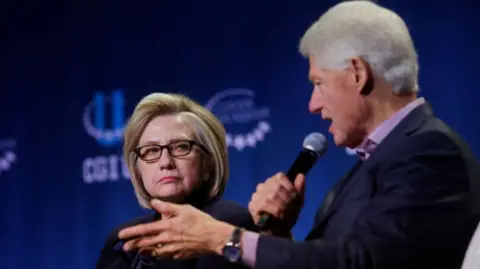In a significant turn of events, former U.S. President Bill Clinton and his wife, Hillary Clinton, have been issued subpoenas from a congressional committee investigating the activities surrounding the late sex offender Jeffrey Epstein. This action was propelled by the House Oversight Committee, chaired by Republican James Comer, who announced the subpoenas on Tuesday. Alongside the Clintons, eight other high-profile individuals have also been summoned as part of this investigation into Epstein’s extensive history, which has caused deep political rifts and heated debates within the U.S. government.
The motivation behind this inquiry stems from actions taken during Donald Trump’s presidency when his administration opted against releasing a trove of federal files tied to Epstein. These files are believed to potentially disclose a “client list” containing the names of various significant figures associated with Epstein, thereby provoking a storm of discontent among both Trump’s staunch supporters and some Democrats. The implications surrounding these documents have resurfaced the topic of accountability and transparency regarding Epstein’s network, fueling further investigation into the actions of multiple administrations including that of former President George W. Bush, Barack Obama, and ultimately Trump.
The subpoena’s timing appears strategic, as it also coincides with escalating tensions between Trump and his conservative base concerning Epstein. The committee, consisting of both Democrats and Republicans, voted to issue subpoenas not just for the Clintons but also for numerous high-ranking officials from both the justice department and the FBI across multiple presidential terms. Notable figures targeted include former Attorneys General Merrick Garland, Loretta Lynch, Eric Holder, Alberto Gonzales, Jeff Sessions, and William Barr, as well as former FBI directors James Comey and Robert Mueller.
Ghislaine Maxwell, an associate of Epstein currently serving a lengthy prison sentence for sex trafficking, had previously indicated her readiness to testify before Congress, albeit with robust legal safeguards in place. However, her planned deposition on August 11 has been postponed indefinitely, adding another twist to the ongoing saga that has stretched over two decades. Since the early 2000s, Epstein’s networking and alleged sexual crimes have attracted law enforcement scrutiny, raising questions about the effectiveness and integrity of the investigative responses elicited by various administrations.
In letters sent out to all those subpoenaed, Comer emphasized the necessity of the committee’s role to oversee the government’s enforcement of sex trafficking laws and specifically how the investigation into Epstein and Maxwell has been managed. As a part of this process, depositions are slated to commence this month, with Bill Clinton’s appearance scheduled for October 14.
Historically, the Clintons’ relationships with Epstein have come under criticism, despite the fact that their connection dates back to years prior to the commencement of the Epstein investigation. Indeed, public records show that Bill Clinton traveled on Epstein’s private plane multiple times during 2002 and 2003 and met with Epstein on several occasions. A spokesperson for Clinton has previously claimed that the former president had no knowledge of the heinous crimes for which Epstein had been prosecuted.
The request for all associated Justice Department documents and communications regarding Epstein and Maxwell has prompted responses from various parties, including the Department of Justice, which declined to comment on the subpoenas. The investigation aims to gather comprehensive information related to human trafficking, sexual abuse, and the handling of cases relevant to Epstein, including records from the infamous 2007 non-prosecution agreement involving Epstein.
As public and media scrutiny intensifies, questions remain as to whether the individuals named by Comer will comply with the subpoenas and if their testimonies will occur publicly. In the past two centuries, only four former presidents have received similar subpoenas from congressional committees—and of those, only two have ever provided testimony. The historical context of such an investigation could have far-reaching implications for those involved, including the potential reshaping of narratives surrounding accountability and the justice system.
Overall, as reactions to the Epstein investigation generate significant political discourse, the ramifications for the Clintons, and indeed all implicated figures, are yet to unfold, making it a compelling focal point in U.S. politics today.












